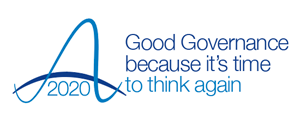A new deal on regulation
07 July 2020

The shock of a rapidly changing world has opened up much-needed space for new thinking. One vital but underexplored area ripe for a new deal is the future relationship between regulation and good governance.
At a special cross-sector summit of regulators hosted by the GGI National Commission recently, one contributor neatly summed up the central conundrum:
“We're asking boards in the NHS to develop good governance that is based on doing the right thing and we're asking regulators to develop a better regulatory role that’s about building the correct culture; I think we need to think about how those two spinning plates come together in the new world.”
Room to change
Even before the pandemic, neither regulators nor regulated seemed able to agree on what good regulation should look like. There was – and still is – not enough joint space and perhaps also not enough appetite to reflect together on a genuinely shared approach that is modern and proportionate and delivers improved public outcomes.
The changed world means there is now clearly more in common between regulators, the boards of the regulated and the people they employ. There are shared challenges of harnessing the potential and minimising the negatives of big data, meeting public expectations for greater citizen involvement to increase legitimacy without compromising integrity, addressing complex problems in the setting of local places with creativity, and – above all – genuinely learning the many lessons COVID-19 has taught us.
Obstacles to overcome
Reaching a shared understanding on any forward-looking approach will not be easy. Almost by definition, regulators have to date been dominated too much by a largely backward-looking and judgmental focus on compliance, in one form or another.
And the regulated have done very little to help change things, being content to nurture a sense of resentment at what they see as largely unjustified, ill-informed and intrusive regulation that drives a defensive and negative culture while requiring a lot of costly servicing. Where, the argument goes, is the added value?
There is no time for this disconnection in the new world. What is needed is something that’s seen as genuinely worthwhile by all parties. This will require change on all sides. So it was hugely encouraging at our summit to see an appetite from regulators across the public sector for creating a new deal on regulation, to be co-owned in the sector of which they are a part.
Fresh start
The best starting point for a new understanding between the regulators and the regulated is surely recognising the scale of shared challenges requiring solutions and the absolute necessity for delivering improved outcomes.
The questions are fundamentally about how the right conditions for sound behaviours and culture can be created and what the relative contributions of good governance and regulation are to success in the new world.
Priorities
Some other important themes also emerged at the summit. These will need to land quickly and convert into practical and visible change.
Firstly, on outcomes, regulators should be able to demonstrate the positive effect of regulation in terms of prevention and good governance, while still measuring input and outputs where outcomes cannot be measured. This has to be a joint enterprise with the regulated, especially boards of organisations and leaders of systems, who will in effect need to operate more overtly as regulators of first choice, connected directly to the public.
Secondly, regulation needs to start focusing on place rather than institutions. This is a longer-term venture but should begin now, offering a fresh start that is both proportionate and effective for big and small enterprises alike.
Thirdly, there should be a move from regulation by crisis to proactive regulation that supports organisations to improve with clear guidance and best practice. At its heart would be a risk-based approach with encouragement for self-regulation by self-referral if issues arise. The trick here will be for the new deal to encourage innovation rather than stifle it, using new technology and working with technology firms as welcome stakeholders.
Lastly, on citizens, the opportunities for greater ownership and positive impact seem huge, but should be taken forward cautiously to prevent any populist interference in regulation. There is a clear role for boards to promote and sponsor this work as it is a natural expectation that local organisations rather than regulators are best placed to engage and grow data. Regulation would clearly be on behalf of citizens rather than on behalf of institutions.
Perhaps most importantly of all, the right space and time needs to be created for the two circles mentioned in the quote above to be explored and a new deal to be forged.
Next steps
The National Commission event was one of those rare occasions when regulators of all sizes and roles come together. It was a good start. Things now need to move forward quickly and not get lost in other agendas.
The way regulation and good governance work together could provide a solid foundation for the new world. The outcomes of the first summit and next steps will be published later in July.
In the meantime boards may wish to consider the following:
- What are you doing actively to change the regulation agenda?
- What more can be done to work together with regulators on shared issues?
- How do we need to change to become regulators of first choice?
- What can we do to support the move to more place-based regulation?
If you wish to be involved in this debate, or you have questions or comments about this briefing, please contact us by calling on 07732 681120 or emailing advice@good-governance.org.uk
Mark Large

